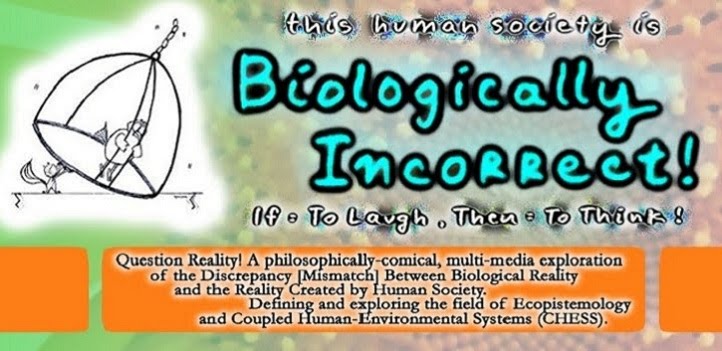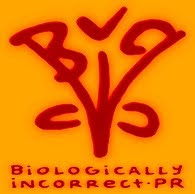Picasaweb Slideshow of Elements and the Evolution of Layers of the Logo.
 One of the best logos emerged from the exercise.
One of the best logos emerged from the exercise.
 One of the best logos emerged from the exercise.
One of the best logos emerged from the exercise.
 One of the best logos emerged from the exercise.
One of the best logos emerged from the exercise.
 One of the best logos emerged from the exercise.
One of the best logos emerged from the exercise.
 One of the best logos emerged from the exercise.
One of the best logos emerged from the exercise.
 One of the best logos emerged from the exercise.
One of the best logos emerged from the exercise.
This weekend I performed a solo meditation at the downtown Kinkos (amen for being 24 hours) and finally cranked out some working logos for my pursuits in this blog and graduate school in general--"Ecology of Scale" and "Biologically Incorrect."
Thanks for a long stretch of time, I added multiple layers of information to this logo. Ranging from 10-20 layers, as if I were composing a full-blown classical music or jazz piece. Given that stretch of space and time, the question is WHY did I design the logos the way that I did. I myself pre-meditated a good deal of the logo (found scratch drawings lying all over my room, actually), but I am sure there is chance hapinstance elements within the logo that just happened to "look good" at the time, and discovered this aesthetic strictly by accident. I was just speaking to Dr. Suarez last night (EEMB Department UCSB) in concern of the proximate and ultimate causes of the design of organisms, just like there are proximate and ultimate causes in the spatial-temporal design of art. I think the main accidental discovery from the images above is the "gray bar" behind the primary font of the logo. I still think there can be some edits made. Oh well. Next round!
First of all, I made the logo because I am becoming (marginally) Institutionally Incorporated at UCSB--not just ANY university, JUST UCSB (plus Oran gave me the nickname of "scale girl," the pressure is truly on)--and I have to design some beautiful piece of conceptual art that embodies who I exactly am and what I exactly intend to do at that point in space and time. Visual artwork (and music) radiates more conceptualism and emotional drive than just pure words in 8-point Garamond font. I already created three primary logos and images, which I gave to Oran (1) The Box (Squirrel Trying to Get the Bird Out of the Cage) (2) Existence in Context (the girl portrayed in Van Gogh or Da Vinci context of Planet Earth) (3) and the Biomathematika Sunflower. So, let's expand this set of logos here.
Geeze, since this is my Ph.D. topic, I started to realize I could talk about these logos FOREVER. So, I better refrain and pace myself here and just etch out some reasons for the included elements within the picture.
(1). The two quizzical ants on different parts and scales of a branching network. These two curious little ants are in quest of the big picture. Based on my writing with The Elephant and the Oak Tree, these two creatures are both very confused about their identities and their perceptions of Reality. They are trying to figure out whether they are on an elephant or an oak tree.
(2). One ant is carrying a piece of equipment, more so a lens. This represents TECHNOLOGICAL-DEPENDENCE of COLLECTIVE PERCEPTION: how scientists are attempting to investigate multiple scales of reality through the medium of externalized tools (not incorporated or evolved from their bodies). It is of question as to what scientists would truly know if you stripped these tools from their collections. Perhaps they would be limited to perceiving certain narrow layers and scales of reality. Another huge problem is that scientists have become OBLIGATELY attached to technology in their thought processes and conclusions rather than FACULTATIVELY attached, aka TECHNOLOGICAL CRUTCHING. So, essentially, machines have taken over the power of human reasoning and the ability for the humans to connect the dots with their own brains, aka Common Sense for individual and collective survival.
(3). There are three boxes, each drawn at different scales. I saw this pattern of arrangement of boxes on the front cover of an Ecology textbook, perhaps from MIT Press. My father showed it to me sometime, and somehow it stuck in my head. (I talked to James, the science writer for Bren, a couple weeks back about how my brain works: my right brain is a sponge: it picks up elements from its surroundings without any necessary prompt or any motivation--e.g. grades--and then I combine these elements, tweak them, and form new products. I have been aware of this intrinsic process of my brain, ever since I stook up an art teacher in a GATE art class. Here is another case in point--sponging up "the boxes" and dumping them into my logo).
(4). The branching patterns transcending the boxes reflect my own "fractal" neurological processes of scale-based reasoning. I feel that the process of "natural selection" whether its organisms or ideas, leads to systems with patterns, chipped off with elements of uniqueness. I think that scientific construct of branching trees doesn't necessarily equate to patterns of our environment, but more so reflects our own fractal-like perception of our environment. We use branching networks as an organizing tool for organizing Reality. In this case, I overlaid branching networks (let's just say they are branches of an oak tree) because I am trying to investigate patterns of logic in scientific and scholarly thought across different scales in space and time--in concern of human-environmental problems. I also ask many scientists, "How can you navel gaze into your own specialized little niche (have a warped log-log view of Reality) if you have lost sight of the big picture?" Ultimately, some scientists have lost relative context of their own reductionist research.
(5). And finally, I added a subset of the Biomathematika sunflower as an unknown treacherous landscape for the two little creatures, yet this landscape is beautiful, due to the fractal properties of the arrangement of [seeds]?
(6). The sixth layer is, of course, my own handwriting "Biologically Incorrect," "Ecology of Scale," and "Scale in Biological and Human-Environmental Systems." The word continues to propagate that I am a "living font." Should sell my hand-writing to the successor of Bill Gates. Will be an interesting business venture! Right. Back up funds for graduate school. I am sure!
 Page 1 from a 12-page excerpt from "Living in a Dying World." PDF File of the version is found here: http://stokastika2.googlepages.com/excerptfromlivinginadyingworld.pdf. The wrting is very rough-and-gruff, but at least it's piecing the parts of the puzzle more than usual.
Page 1 from a 12-page excerpt from "Living in a Dying World." PDF File of the version is found here: http://stokastika2.googlepages.com/excerptfromlivinginadyingworld.pdf. The wrting is very rough-and-gruff, but at least it's piecing the parts of the puzzle more than usual.  Towards a Psychology and Human Ecology of Scale Page 1. ROUGH DRAFT. Resulting document from re-reading the excerpt "Living in a Dying World."
Towards a Psychology and Human Ecology of Scale Page 1. ROUGH DRAFT. Resulting document from re-reading the excerpt "Living in a Dying World." Towards a Psychology and Human Ecology of Scale Page 2. ROUGH DRAFT. Resulting document from re-reading the excerpt "Living in a Dying World." PDF file of Psychology/Human Ecology of Size can be found here: http://stokastika2.googlepages.com/psychologyofscaleSKETCH.pdf.
Towards a Psychology and Human Ecology of Scale Page 2. ROUGH DRAFT. Resulting document from re-reading the excerpt "Living in a Dying World." PDF file of Psychology/Human Ecology of Size can be found here: http://stokastika2.googlepages.com/psychologyofscaleSKETCH.pdf.















